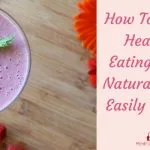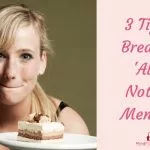Changing Eating Habits Can Be Easy
Truly, changing eating habits does not have to be a struggle! And from my experience with clients, there are 4 common myths, (or internal beliefs) I see repeatedly. Internal beliefs should never be underestimated because they construct our reality. Time and time again, it’s always the same thing(s) holding people back from making long-lasting behavioral changes. I share these 4 common beliefs in this blog, so you can avoid them for yourself – fast-tracking your health, fitness, and eating goals.

Belief 1: ‘I Need To Feel Motivated At All Times’
This belief is inherently problematic because motivation fluctuates by its very nature. Some days we feel it, other days we do not (it’s unreliable!). For example, do you feel like going to work every day? For me, some days I would rather stay in bed. But I know, I have to get up. Essentially, the same applies to eating. Some days you don’t feel motivated to cook. Other days you are exhausted and don’t want to go to the gym. So what do we do about this belief?
RAISE YOUR STANDARDS AND COMMIT TO A DECISION
Commit! Commit to a decision. Just like you have committed to your work with a contract. In this way, there will be consequences if you don’t go to work, just because you don’t feel like getting out of bed in the morning. Now, this concept applies to any goal that we have in life. Essentially, decide for yourself – ‘This is what I do from now on.’ And stop re-negotiating with yourself and make it a habit to follow through. This is the way you live from now on. Write the following in your journal, or a piece of paper you stick on the fridge: ‘I am committing to ______. I no longer negotiate with myself. This action aligns with my health, fitness, and wellbeing goals.’

Belief 2: ‘I Need Self-Control And Stronger Willpower’
Willpower and self-control are hard. Saying ‘no’ to ourselves is a muscle we need to practice. In particular, when we are tired and stressed we will find it more difficult. And this is how we end up in the pantry with a whole packet of biscuits. Willpower is challenging long term, because just like our arm muscles – if you are always holding something heavy, at some point you will drop. So, we can’t rely on willpower and self-control, because it makes us tired.
WORK WITH OUR PSYCHOLOGY TO CHANGE EATING HABITS
Moreover, as humans, we are naturally wired to seek pleasure and avoid pain. If something feels hard, for example ‘I don’t want to do this diet again, and eat all these unsatisfying salads’. You will not last the long game. Even the idea of doing something not pleasurable will require so much energy. This is how we feel we can’t motivate ourselves to go on a diet again and “procrastinate” or telling ourselves, we are going “back on track” on Monday.

SO WHAT DO I DO?
The aim is to eat in a way that is sustainable long-term. Do you think you will be able to do weight watchers or Jenny Craig for the rest of your life? Probably not. But, when we eat in a way that is easy for us [a variety of foods, adequate calories, and availability of foods that give us pleasure], we cultivate an easy relationship with food. I talk more about this in my Balanced Diet Framework.
The ultimate aim is food stops controlling us and consuming our thoughts. Changing eating habits does not have to be a struggle if we stop labeling foods as ‘good’ or ‘bad’. When we stop restricting foods and having rules, our brain can relax and stop obsessing. This is one key in creating long-lasting habits and rewiring our brain so they become second nature.

Belief 3: ‘Creating Habits Takes 21 Days’
No. This is oversimplistic. How long a habit takes to integrate into life depends on the nature of the habit. For example, having one glass of water every morning is easier to implement than running 21 kilometers every week. My suggestion is to remove the focus from ‘how long it will take’, and decide to make the habit ‘life-long’. So decide on habits you find joy in. Because if it makes you feel good, you will naturally want to do it. Choose habits that serve you and give pleasure. (For more on habits, check out Break Automatic Habits Based on Neuroscience]

Belief 4: ‘I Just Need To Know What To Eat And A Diet Plan I Can Follow’
So many clients tell me this. But 90% of the time, they KNOW what healthy eating looks like. But the critical question is why are they not doing it? Why are they not doing what they know is good for them? This is where my work comes in. We dig below the surface to uncover the triggers. And it’s never a lack of willpower. We uncover the driving forces that lead us to standing in front of a beeping fridge over and over again. Ask yourself, are you eating when stressed? worried? sad? lonely? emotional? distracting yourself escapism?

Smash These Limiting Beliefs Because Changing Eating Habits Can Be Easy
Finally, beliefs are powerful. Try bypassing these hidden roadblocks in your own journey to changing eating habits. Also, make sure you check out my free guide: The 8 Hidden Reasons For Overeating And Binge Eating. This will help you identify your individual (often hidden) reasons for your eating behaviors. Further, I give specific suggestions on what you can do instead to address your main cause. So, stop guessing to change your habits and life. If you are interested in my personal story, read My Binge Eating Disorder Recovery Story [What I Did Step By Step].
6 KEY STEPS TO END BINGE EATING CYCLE & RELEASE EMOTIONAL WEIGHT
Regain power over food! Binge eating and emotional eating is not a food problem, it is an emotional problem. We can’t rely on will-power to stop binge eating. In this e-book I am addressing the underlying reasons why we use food as a drug and what our body is trying to tell us.



